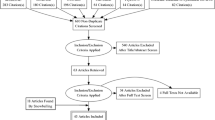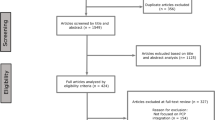Abstract
Objective
To explore responses from primary care physicians (PCPs) from an integrative physician (IP) consultation and recommended integrative oncology (IO) treatment program.
Methods
Chemotherapy-treated patients were referred by their oncology healthcare professional to an IP, a physician dually trained in complementary medicine and supportive cancer care. The consultation summary and patient-centered IO treatment program was then sent to the patient’s PCP, with PCP-to-IP responses analyzed qualitatively using ATLAS.Ti software for systematic coding and content analysis. Trial Registration Number NCT01860365 published May 22, 2013.
Results
Of the 597 IP consultations conducted, 470 (78.7%) summaries were sent to patients’ PCPs, with only 69 (14.7%) PCP-to-IP responses returned. PCPs were more likely to respond if the patient was Hebrew-speaking (78.3% vs. 65.1%, P = 0.032). Systematic coding identified four predominant themes among PCP narratives: addressing the patient’s medical condition and leading QoL-related concerns; patient-centered reflections; available resources providing support and promoting resilience; and PCP attitudes to the IO treatment program.
Conclusion
PCP-IP communication can provide valuable insight into the patient’s bio-psycho-social care, addressing the patient’s health-belief model, emotional concerns, caregiver-related factors, preferences, and barriers to adherence to IO care.
Practice implications
Healthcare services should consider promoting IP-PCP communication in order to facilitate better patient outcomes from an IO treatment program.
Similar content being viewed by others
Data availability
The data supporting the findings of this study are available from the corresponding author upon reasonable request.
References
McConnell D, Butow PN, Tattersall MH (1999) Improving the letters we write: an exploration of doctor-doctor communication in cancer care. Br J Cancer 80:427–437. https://doi.org/10.1038/sj.bjc.6690374
Newton J, Eccles M, Hutchinson A (1992) Communication between general practitioners and consultants: what should their letters contain? BMJ 304:821–824. https://doi.org/10.1136/bmj.304.6830.821
Epstein RM (1995) Communication between primary care physicians and consultants. Arch Fam Med 4:403–409. https://doi.org/10.1001/archfami.4.5.403
Jiwa M, Burr J (2002) GP letter writing in colorectal cancer: a qualitative study. Curr Med Res Opin 18:342–346. https://doi.org/10.1185/030079902125000886
Grol R, Rooijackers-Lemmers N, van Kaathoven L, Wollersheim H, Mokkink H (2003) Communication at the interface: do better referral letters produce better consultant replies? Br J Gen Pract 53:217–219
Schnyder U, Feld C, Leuthold A, Buddeberg C (1997) Reference to psychiatric consultation in the discharge letter of general hospital inpatients. Int J Psychiatry Med 27:391–402. https://doi.org/10.2190/ADMY-B6Y3-3YTT-8X0F
de Cruppé W, Hennch C, Reas D, Wild B, Herzog W (2002) Reporting psychosomatic consultations in the discharge letter: an examination of communication between inpatient and primary care physicians. Gen Hosp Psychiatry 24:343–352. https://doi.org/10.1016/s0163-8343(02)00202-5
Mc Larnon E, Walsh JB, Ni SA (2016) Assessment of hospital inpatient discharge summaries, written for general practitioners, from a department of medicine for the elderly service in a large teaching hospital. Ir J Med Sci 185:127–131. https://doi.org/10.1007/s11845-014-1236-7
Timmins L, Kern LM, O’Malley AS, Urato C, Ghosh A, Rich E (2022) Communication gaps persist between primary care and specialist physicians. Ann Fam Med 20:343–347. https://doi.org/10.1370/afm.2781
Scaioli G, Schäfer WLA, Boerma WGW, Spreeuwenberg PMM, Schellevis FG, Groenewegen PP (2020) Communication between general practitioners and medical specialists in the referral process: a cross-sectional survey in 34 countries. BMC Fam Pract 21:54. https://doi.org/10.1186/s12875-020-01124-x
Ben-Arye E, Traube Z, Schachter L, Haimi M, Levy M, Schiff E et al (2011) Integrative pediatric care: parents’ attitudes toward communication of physicians and CAM practitioners. Pediatrics 127:e84-95. https://doi.org/10.1542/peds.2010-1286
Ben-Arye E, Hamadeh AMA, Schiff E, Jamous RM, Dagash J, Jamous RM et al (2015) Compared perspectives of Arab patients in Palestine and Israel on the role of complementary medicine in cancer care. J Pain Symptom Manage 49:878–884. https://doi.org/10.1016/j.jpainsymman.2014.10.006
Schiff E, Frenkel M, Shilo M, Levy M, Schachter L, Freifeld Y et al (2011) Bridging the physician and CAM practitioner communication gap: suggested framework for communication between physicians and CAM practitioners based on a cross professional survey from Israel. Patient Educ Couns 85:188–193. https://doi.org/10.1016/j.pec.2010.08.029
Ben-Arye E, Scharf M, Frenkel M (2007) How should complementary practitioners and physicians communicate? A cross-sectional study from Israel. J Am Board Fam Med 20:565–571. https://doi.org/10.3122/jabfm.2007.06.070119
Ben-Arye E (2010) The role of dual-trained conventional/complementary physicians as mediators of integration in primary care. Evid Based Complement Alternat Med 7:487–491. https://doi.org/10.1093/ecam/nen033
Keshet Y, Schiff E, Samuels N, Ben-Arye E (2015) Giving voice to cancer patients: assessing non-specific effects of an integrative oncology therapeutic program via short patient narratives. Psychooncology 24:169–174. https://doi.org/10.1002/pon.3621
Hsieh H-F, Shannon SE (2005) Three approaches to qualitative content analysis. Qual Health Res 15:1277–1288. https://doi.org/10.1177/1049732305276687
Mao JJ, Pillai GG, Andrade CJ, Ligibel JA, Basu P, Cohen L et al (2022) Integrative oncology: addressing the global challenges of cancer prevention and treatment. CA Cancer J Clin 72:144–164. https://doi.org/10.3322/caac.21706
Broom A, Adams J (2009) Oncology clinicians’ accounts of discussing complementary and alternative medicine with their patients. Health (London) 13:317–336. https://doi.org/10.1177/1363459308101806
Salamonsen A (2013) Doctor-patient communication and cancer patients’ choice of alternative therapies as supplement or alternative to conventional care. Scand J Caring Sci 27:70–76. https://doi.org/10.1111/j.1471-6712.2012.01002.x
Kristoffersen AE, Nilsen JV, Stub T, Nordberg JH, Wider B, Mora D et al (2022) Use of complementary and alternative medicine in the context of cancer; prevalence, reasons for use, disclosure, information received, risks and benefits reported by people with cancer in Norway. BMC Complement Med Ther 22:202. https://doi.org/10.1186/s12906-022-03606-0
Balneaves LG, Watling CZ, Hayward EN, Ross B, Taylor-Brown J, Porcino A et al (2022) Addressing complementary and alternative medicine use among individuals with cancer: an integrative review and clinical practice guideline. J Natl Cancer Inst 114:25–37. https://doi.org/10.1093/jnci/djab048
Schofield P, Diggens J, Charleson C, Marigliani R, Jefford M (2010) Effectively discussing complementary and alternative medicine in a conventional oncology setting: communication recommendations for clinicians. Patient Educ Couns 79:143–151. https://doi.org/10.1016/j.pec.2009.07.038
Tenner L, Hlubocky FJ, Blanke CD, LeBlanc TW, Marron JM, McGinnis MM et al (2019) Let’s talk about those herbs you are taking: ethical considerations for communication with patients with cancer about complementary and alternative medicine. J Oncol Pract 15:44–49. https://doi.org/10.1200/JOP.18.00432
Blödt S, Mittring N, Schützler L, Fischer F, Holmberg C, Horneber M et al (2016) A consultation training program for physicians for communication about complementary medicine with breast cancer patients: a prospective, multi-center, cluster-randomized, mixed-method pilot study. BMC Cancer 16:843. https://doi.org/10.1186/s12885-016-2884-y
Popper-Giveon A, Schiff E, Ben-Arye E (2012) I will always be with you: traditional and complementary therapists’ perspectives on patient-therapist-doctor communication regarding treatment of Arab patients with cancer in Israel. Patient Educ Couns 89:381–386. https://doi.org/10.1016/j.pec.2012.03.016
Ben-Arye E, Keshet Y, Gressel O, Tapiro Y, Lavie O, Samuels N (2021) Being in touch: narrative assessment of patients receiving online integrative oncology treatments during COVID-19. Support Care Cancer 29:4819–4825. https://doi.org/10.1007/s00520-021-06026-x
Ben-Arye E, Israely P, Baruch E, Dagash J (2014) Integrating family medicine and complementary medicine in cancer care: a cross-cultural perspective. Patient Educ Couns 97:135–139. https://doi.org/10.1016/j.pec.2014.06.006
Abrams D, McCulloch M, Cohen M, Liaw M, Silverman D, Wilson C (2018) A survey of licensed acupuncturists in the san francisco bay area: prevalence of treating oncology patients. Integr Cancer Ther 17:92–98. https://doi.org/10.1177/1534735416684946
Hall H, Leach MJ, Brosnan C, Cant R, Collins M (2018) Registered Nurses’ communication about patients’ use of complementary therapies: a national survey. Patient Educ Couns 101:1403–1409. https://doi.org/10.1016/j.pec.2018.03.010
Ben-Arye E, Shavit E, Wiental H, Schiff E, Agour O, Samuels N (2016) Overcoming communication challenges in integrative supportive cancer care: the integrative physician, the psycho-oncologist, and the patient. Complement Ther Med 29:9–15. https://doi.org/10.1016/j.ctim.2016.09.001
Samuels N, Ben-Arye E (2020) Exploring herbal medicine use during palliative cancer care: the integrative physician as a facilitator of pharmacist–patient–oncologist communication. Pharmaceuticals 13(12):455. https://doi.org/10.3390/ph13120455
O’Malley AS, Reschovsky JD (2011) Referral and consultation communication between primary care and specialist physicians: finding common ground. Arch Intern Med 171:56–65. https://doi.org/10.1001/archinternmed.2010.480
Russell C, Sandu V, Moroz I, Tran C, Keely E, Liddy C (2020) Key components of traditional consultation letters and their relevance to electronic consultation replies: a systematic review. Telemed J E Health 26:689–699. https://doi.org/10.1089/tmj.2019.0161
Ben-Arye E, Dagash J, Silbermann M, Saad B, Steiner M, Popper-Giveon A, et al (2015) [Modeling integrative oncology care program for Arab patients in north Israel: towards quality of life improvement during chemotherapy]. Harefuah 154:26–30, 69, 68
Ben-Arye E, Steiner M, Karkabi K, Shalom T, Levy L, Popper-Giveon A et al (2012) Barriers to integration of traditional and complementary medicine in supportive cancer care of arab patients in northern Israel. Evid Based Complement Alternat Med 2012:401867. https://doi.org/10.1155/2012/401867
Author information
Authors and Affiliations
Contributions
We declare that all authors authentise credit author statement regarding the article “Exploring primary care physician feedback following an integrative oncology consultation.” EBA organized the trial and collected the data analyzed in this study. EBA, RG, and MH planned the study. EBA, YK, RG, and MH carried out the analysis. MH, EBA, and NS wrote a draft manuscript. All authors participated in the revision of the manuscript.
Corresponding author
Ethics declarations
Ethics approval
The study protocol was approved (0024–09-CMC) by the Ethics Review Board (Helsinki Committee) of the Carmel Medical Center in Haifa, Israel. The study was registered at ClinicalTrials.gov (NCT01860365) published on May 22, 2013. Participants signed an informed consent form before entering the study.
Competing interests
The authors declare no competing interests.
Additional information
Publisher's Note
Springer Nature remains neutral with regard to jurisdictional claims in published maps and institutional affiliations.
Michael Hauzer and Ran Grimberg should be considered co-first authors, based on their equal and significant contributions to this study.
Rights and permissions
Springer Nature or its licensor (e.g. a society or other partner) holds exclusive rights to this article under a publishing agreement with the author(s) or other rightsholder(s); author self-archiving of the accepted manuscript version of this article is solely governed by the terms of such publishing agreement and applicable law.
About this article
Cite this article
Hauzer, M., Grimberg, R., Samuels, N. et al. Exploring primary care physician feedback following an integrative oncology consultation. Support Care Cancer 31, 606 (2023). https://doi.org/10.1007/s00520-023-08079-6
Received:
Accepted:
Published:
DOI: https://doi.org/10.1007/s00520-023-08079-6




